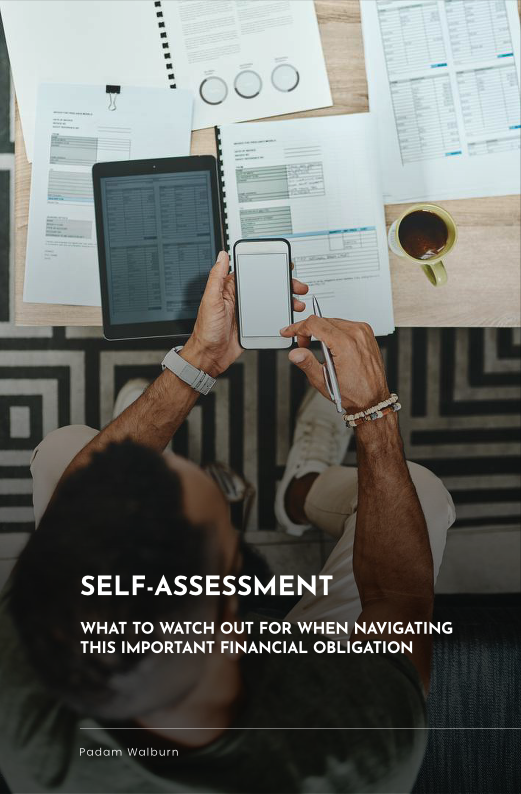
The UK self-assessment system has its quirks and nuances, and understanding how to stay compliant is crucial to a smooth and stress-free income tax process.
From early paper deadlines to penalties for late-filers, self-assessment holds a few surprises. As always, a professional accountant can help you navigate the process successfully, make the most of available tax reliefs, and avoid potential pitfalls along the way.

Self-assessment: What is it?
Self-assessment is the system the UK Government uses to collect income tax. This requires many individuals and businesses to declare their untaxed income, capital gains and other relevant financial information to HMRC.
Over 11 million taxpayers filed a self-assessment return for the 2021/22 tax year, and this number is likely to rise for 2022/23. As such, it is essential to understand your reporting obligations. Here are some of the main aspects to be aware of this self-assessment season.
Who needs to send a tax return?
You will be required to send a tax return if, in the last tax year (6 April 2022 to 5 April 2023), any of the following applied:
• you were self-employed as a sole trader and earned more than £1,000 (before taking off anything you can claim tax relief on)
• you were a partner in a business partnership
• you had a total taxable income of more than £100,000
• you had to pay the high income child benefit charge.
You may also need to send a tax return if you have any untaxed income, such as:
• money from renting out a property
• tips and commission
• income from savings, investments, and dividends
• foreign income.
You can confirm whether you need to send a self-assessment tax return on the Government website or by getting in touch with your accountant.
Deadlines matter
One of the first aspects to watch out for is the importance of deadlines. Filing your self-assessment on time is crucial to avoid penalties.
The deadline for paper returns is 31 October following the end of the relevant tax year, while the deadline for online submissions is 31 January of the following year. That means that you must file your online self-assessment tax return for the 2022/23 tax year return by midnight, 31 January 2024. You’ll also need to pay the balance by this date.
Missing these deadlines can result in financial penalties, so you should mark these dates in your calendar. These late-filing; penalties can vary depending on the degree of lateness and the amount of tax owed. HMRC will also charge interest on late payments.
If you are filing a self-assessment for the first time, you’ll need to first register with HMRC. Often, people assume that the deadline for registering is the same as the deadline for submitting, and thus end up registering late. In fact, you will need to register by 5 October; for instance, if you need to file for the 2023/24 tax year, you should register by 5 October 2024.

What should self-assessment taxpayers look out for?
Accurate recordkeeping
One critical element of self-assessment is the need to maintain accurate financial records. Keeping well-organised records of your income, expenses and other financial transactions will significantly ease the self-assessment process.
Effective record-keeping ensures you are not overpaying or underpaying your taxes and provides an accurate snapshot of your financial health. Recording all your business transactions can also make it easier to maximise expense claims and reduce your tax bill.

Providing accurate information is crucial when filling out your self-assessment form. Collaborate closely with your accountant and be thorough in providing all necessary financial information.
HMRC enquiries
You should be aware that HMRC can conduct an enquiry into your self-assessment. In such cases, your accountant plays a crucial role by providing the necessary records and explanations to HMRC. Again, accurate record-keeping is essential for these situations.
Mistakes can lead to penalties
HMRC has the authority to impose penalties for inaccuracies in your self-assessment, whether they are intentional or not. Failing to take reasonable care when completing your return or providing inaccurate information can lead to more severe fines. Your accountant’s role is vital in ensuring the accuracy of your submission. If you do spot an historic mistake in your self-assessment, it is worth amending this yourself, rather than waiting for HMRC to raise the issue. This will typically result in significantly lower penalties (if any).
Tax planning opportunities
Self-assessment season also presents opportunities for tax planning. Working with your accountant, you can identify legitimate deductions, reliefs and allowances that can reduce your overall tax liability.
As a result, it’s vital to start your self-assessment return earlier rather than later. This can give you more time to explore different tax reliefs and maximise your expense claims, making it easier to save money and helping you stay compliant with the law.
Allowable expenses
When filing your self-assessment, allowable expenses play a crucial role in determining your taxable income. These include costs directly related to business operations or those incurred while earning income.
Common allowable expenses span office rent, utilities, and office supplies for the self-employed. Travel expenses, both local and business-related, are eligible, as are costs associated with professional development. Additionally, allowable expenses cover financial and professional fees, such as accountant charges. However, it’s essential to meticulously document and justify each expense, ensuring compliance with HMRC guidelines.
Marriage allowance
Marriage allowance can be a valuable tax-saving opportunity for married couples and civil partners. In certain circumstances, this tax break allows you to transfer a portion of your personal allowance to your spouse or civil partner.

Take advantage of tax-saving opportunities
Always be on the lookout for tax-saving opportunities. The UK tax system is complex, and tax regulations are constantly changing. As income tax experts, we can keep you informed about new opportunities and help you adapt your financial strategies accordingly.
Paying your income tax bill
Understanding how to make your income tax payments is another aspect to watch out for.
Repeat self-assessment customers often need to pay their bills in two instalments. This process is known as payments on account.
The first payment is due by 31 July following the end of the relevant tax year, with your final ‘balancing’ payment due by 31 January. If you cannot pay your tax bill in full, you may be able to set up ‘a payment plan to pay it in monthly instalments — generally over a 12-month period. This is called a ‘Time to Pay’ arrangement.
Depending on your circumstances, some arrangements can be made over longer periods.


Navigate the self-assessment
Process with confidence
Self-assessment is a significant financial obligation that should not be taken lightly. Working closely with a professional accountant who is well-versed in the latest tax regulations can help ensure that the process is as efficient, accurate and stress-free as possible.
As income tax experts and professional bookkeepers, we can help you understand the intricacies of self-assessment. With our support, you’ll be able to keep accurate records, meet deadlines and make the most of available tax-saving opportunities.
By watching out for the aspects mentioned here, you can navigate the self-assessment process with confidence, ensuring you comply with tax regulations and make the most of your financial resources.

Need assistance with your self-assessment? Get in touch today.

